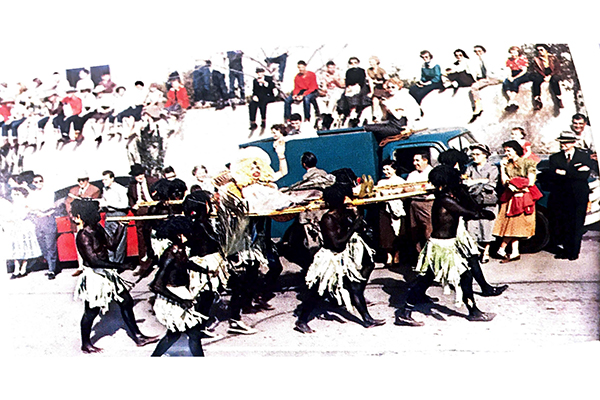When Roundup was first advertised as a homecoming event in 1930, the ad read “The Texas Round-Up! Welcomes Each and Every Visitor to the University of Texas Campus.’ However, after decades of racist displays occurring during the event, not everyone feels welcome to attend.
After a Roundup event in 2017, public health junior Kassa Kassahun and a friend were approached by several students to take a group picture. Three days later, they were tagged in Instagram photos mistaking them as members from a rap group who performed that day — just because they are black.
“When I saw the posts, I was completely taken aback,” Kassahun said. “That’s why they wanted to take a picture, so I was pretty upset.”
Neither Kassahun nor his friend resemble any member of the all-black rap group, FOE G4NG, they were mistaken for.
Kassahun said he hasn’t been to a Roundup event since then.
“I know for a lot of minorities, their thoughts on Roundup are very negative,” Kassahun said. “It doesn’t make sense when you have black artists performing at your events, but you don’t support black people on campus.”
Throughout the 20th century, The Daily Texan and UT’s yearbook, The Cactus, chronicled several instances of blackface, racist parade floats and other insensitive actions at Roundup.
In 1933, a yearbook photograph depicts “Thetas” clad in tribal attire and dark body paint. More than two decades later, Delta Sigma Phi fraternity members won “Most Comical” in the 1955 annual parade after painting their bodies black and presenting a “Natives” themed float.
“By itself — as a spring homecoming for alumni and ‘party weekend’ for students — I wouldn’t classify the original version of Roundup as racist,” UT historian Jim Nicar said. “By the 1980s, though, it had evolved into something else.”
In 1982, the Texan reported three Jewish fraternities withdrew from Sigma Chi’s Fight Night after the fraternity printed anti-Semitic advertisements for the event. Two years later, the Texan reported Alpha Tau Omega and Zeta Psi were penalized when they modeled Roundup floats that then Interfraternity Council president David Sheehan said “could be perceived as being racist.”
Walter Buenger, a professor of Texas history, said this behavior occurred in part because participants sought enjoyment from degrading already marginalized groups.
“I suspect that the crowds who watched appreciated having their racial stereotypes reinforced and perhaps also enjoyed demeaning others,” Buenger said. “It demonstrated and reminded them of their own racial and social superiority — at least in their minds.”
In 1990, the Texan reported an unidentified individual painted racial slurs onto a car Delta Tau Delta used in the Roundup parade. During the same weekend, Phi Gamma Delta distributed t-shirts portraying Michael Jordan with ape-like facial features.
Nicar said these acts ignited days of University-wide protests and resulted in a reduction of Roundup funding by Texas Exes. Then-UT president William Cunningham later announced in 1990 that Roundup would no longer be a University-sanctioned event, according to a 2011 Texan article.
Since Roundup split from the University, it has become increasingly centered around Greek life, with mostly fraternities and sororities throwing parties and inviting popular musicians.
Peter Driscoll, former Interfraternity Council president and current advisory board member, said he acknowledges Roundup’s racist past. He said he believes the council has not officially addressed Roundup’s history but would be eager to if it were brought to their attention.
“We’re so far removed from that history at this point that most people aren’t even aware of that history,” Driscoll said. “The only people that are aware, are because they researched…Roundup’s history.”
Driscoll said the council’s authority is only significant on paper, so its ability to control member fraternities at Roundup is limited. Fraternities value diversity, Driscoll said, but the cost to join these organizations can be a barrier.
“Honestly, members of (the council) are not racist, and they are not perpetuating that reputation at all — it’s just purely circumstantial,” Driscoll said. “A lot of these organizations have diverse elements, and they really view it very positively when they can promote diversity within their organizations.”
Kassahun said the Roundup events he attended in 2017 were primarily white, and because of the lack of diversity he’s not surprised he and his friend were mistaken as some of the entertainers at that year’s Roundup. He said when he created a viral Twitter thread documenting his experience, many other students reached out to him with similar stories.
“People came to me telling me and educating me on how this is one of many incidents that have occurred,” Kassahun said. “They were telling me what happened to them, and some people were telling me that they’ve been confused for a person who performed in the past as well.”
Going forward, Kassahun said he would like to see the fraternity council address Roundup’s racist past and make changes to the event, such as partnering with multicultural organizations to welcome more students.
“I know that they don’t speak on their history of (racism), but maybe (they should) address the history and actually own up to your history and say, ‘We’re trying to be better than this,’” Kassahun said. “Try to fix that connection because it’s very broken right now.”





















